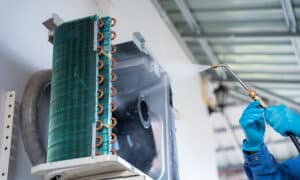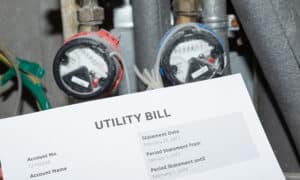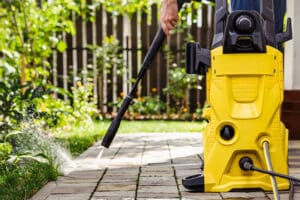Does Pressure Washing Improve Energy Efficiency?

Pressure washing is often seen as a simple way to enhance curb appeal, but its benefits go beyond just aesthetics. Pressure washing can improve energy efficiency in both residential and commercial buildings. By cleaning critical areas such as solar panels, windows, and HVAC systems, pressure washing helps these components perform optimally.
Can Pressure Washing Improve Energy Efficiency?
In a word, yes. Pressure washing can significantly improve energy efficiency. Dirt and grime accumulate on surfaces like solar panels, windows, and HVAC systems, hindering their ability to function efficiently. A clean surface allows these components to do their job more effectively, using less energy. Pressure washing ensures that dirt and debris don’t compromise energy performance, helping reduce energy consumption.
How Can Pressure Washing Improve Energy Efficiency?
There are several ways pressure washing contributes to better energy efficiency. Here are some key areas where regular cleaning can make a substantial difference.
1. Cleans Dirty Solar Panels
Solar panels rely on direct sunlight to generate electricity. When covered with dust, bird droppings, or pollution, they absorb less sunlight, reducing their energy output. Studies have shown that dirty solar panels can lose up to 30% of their efficiency.
By pressure washing these panels, you can restore their maximum functionality. Clean panels capture more sunlight, producing more energy. Ultimately, you can reduce your reliance on traditional power sources. In the long run, this can lead to significant savings on electricity bills for homes and businesses alike.
2. Cleans Dirty Windows
Windows play a key role in regulating indoor temperatures and letting in natural light. When windows are dirty, they block sunlight from entering, causing people to rely more on artificial lighting and heating systems.
When you pressure wash windows, you allow more sunlight to brighten and warm your spaces. This reduces the need for artificial lighting and heating, improving your building’s energy efficiency. Clean windows can make a noticeable difference, especially in large buildings or homes with many windows.
3. Cleans Dirty HVAC Systems

Pressure washing can clean these outdoor units, improving airflow and making the system work more efficiently. This not only reduces energy use but also prolongs the lifespan of the HVAC system, helping you save money on potential repairs or replacements.
Indirect Impact of Pressure Washing on Energy Efficiency
In addition to the direct benefits, pressure washing indirectly affects energy efficiency. For example, clean exterior walls and roofs reflect more sunlight and heat than dirty ones. This helps buildings stay cooler in the summer, reducing air conditioning system load. As a result, your building consumes less energy to maintain a comfortable indoor temperature.
Regular pressure washing also helps prevent damage to building materials. Dirt, mold, and algae can degrade surfaces over time, leading to costly repairs. Keeping these areas clean helps preserve their integrity. You can then reduce the need for repairs or replacements in the future.
Does Pressure Washing Save Water?
While some might assume pressure washing uses too much water, it is a water-efficient cleaning method. It uses less water than traditional methods like hosing or manual scrubbing.
Pressure washing uses high-pressure water to clean surfaces quickly, so less water is necessary to achieve the same level of cleanliness. Advanced pressure washers are also designed to be more water-efficient, making this cleaning method friendly to the environment. By using less water, pressure washing helps conserve resources while also improving the cleanliness of your building.
In some cases, pressure washing can even reduce the need for harsh cleaning chemicals. Traditional cleaning often relies on detergents and other products that can harm the environment. Pressure washing’s high-pressure water stream can often clean surfaces effectively without the need for additional chemicals, making it a popular, eco-friendly choice.
Can Pressure Washing Save You Money?

Pressure washing also helps extend the lifespan of exterior surfaces and systems. It cleans dirt, mold, and algae, which cause premature deterioration. By taking advantage of a pressure washer, you can avoid expensive repairs or replacements down the line. As they say, prevention is better than the cure. This means regular cleaning is better—and cheaper than repairs or replacements.
Lastly, pressure washing maintains your property’s aesthetic appeal, which can help preserve its market value. Well-maintained buildings attract higher rents or resale values, giving property owners an added financial benefit beyond energy savings.
Does Pressure Washing Help Prevent Health Issues?
Another often overlooked benefit of pressure washing is its ability to prevent health issues that can indirectly affect energy efficiency. Mold, mildew, and algae buildup on surfaces can lead to poor air quality, causing respiratory problems for occupants. A building with poor air quality may see occupants relying more on HVAC systems to maintain ventilation and a comfortable indoor climate.
By pressure washing exterior surfaces, you reduce the buildup of harmful allergens and pollutants, leading to cleaner air. This reduces the reliance on ventilation systems. Ultimately, this contributes to lower energy use and a healthier environment for everyone.
Pressure Washing and Commercial Buildings
The benefits of pressure washing can be even more significant for commercial buildings. Larger buildings consume more energy so that any inefficiencies can result in higher operational costs. Regular pressure washing of windows, walls, and HVAC units can dramatically reduce these costs.
In addition, well-maintained commercial properties are more likely to attract tenants and customers, giving property owners a competitive advantage in the market. Cleanliness and energy efficiency often go hand in hand, making pressure washing an important part of building maintenance in the commercial sector.
Does Pressure Washing Improve Energy Efficiency? Answered!
Pressure washing can positively affect energy efficiency. By cleaning critical areas, pressure washing enhances energy performance and lowers operating costs. It saves water, reduces the need for costly repairs, and supports a more efficient environment. Regular pressure washing is a smart investment for residential and commercial property owners. Just make sure to hire the pros.
Superb Softwash offers professional residential and commercial pressure washing services. Call us today at 210.649.5655 or contact us online to get a free estimate!
RELATED ARTICLES:
